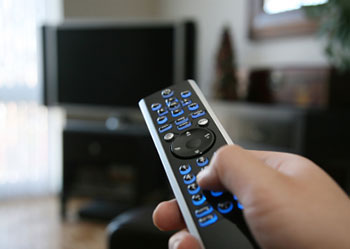More Health and Nutrition Bites
Related
Do Snack Food Commercials Make You Eat More?
A few years ago I reported on two studies that indicated that children eat more when they're watching TV while they're eating and that adults who watched less television ate less and burned more calories than their peers who watched all the TV they wanted. Clearly television has an effect on your eating. But what about the content of what you're watching - or more specifically, what about the food commercials?
Children's Weight and "Media Time"
The American Academy of Pediatrics (AAP) has issued national guidelines recommending that parents limit media time (including television or computer use) for their children over two years of age to just 1 to 2 hours per day of quality programming. While previous studies link childhood obesity with television and video watching, few of those studies actually focus on the AAP's recommended cut-off times. Nor have those studies sought to link computer use with childhood obesity.
Try Turning Off the Television
When it comes to diet and nutrition, I can understand why people look for simple answers. It's much easier to say "avoid carbohydrates," or "don't eat wheat products," or "all fat is bad" or even "all oils are bad" than to remember to eat fish several times a week, remember which are the best fish, and also keep in mind how much fish is the right amount.
Health & Nutrition Bites
Get the latest health and diet news - along with what you can do about it - sent to your Inbox once a week. Get Dr. Gourmet's Health and Nutrition Bites sent to you via email. Sign up now!
Avoid distractions

Back in 2006 and 2007 I reported on two studies that showed that both adults and children tended to eat more while they watched TV. Listening to music also seems to affect how much you eat. The theory is that being distracted from what you're eating appears to reduce your attention from physical or mental cues to stop eating.
Researchers at the University of Birmingham in the United Kingdom sought to gain greater understanding of the distraction phenomenon by adding the question of snacking to the equation (Appetite 2015;92:287-294). They designed three brief studies to find out if being distracted in various ways while eating a meal would have an effect on how much a person ate later. In all three studies, the participants were split into three groups, with one group serving as a control group. They were served a standardized lunch followed 2-3 hours later with the opportunity to snack on as many cookies as they wished. Appetite and mood questionnaires were administered before each eating session.
In the first study the two test groups were asked to play a simple computer game that was designed to be played easily with one hand while they ate lunch. One of the test groups was told that a reward would be offered for the participant who won the game the most, while the other was just asked to play the game while eating.
In the second study the two test groups watched a television clip while eating. One clip showed a celebrity chef making a dish similar to what the participants were served for lunch, while the other was a clip matched for how interesting, entertaining, and funny it was, although it was not about food or eating.
The final study had the two test groups listening to a guided imagery session through headphones while eating. One imagery session asked the participant to imagine they were outside of themselves, watching themselves eat. The other asked them to imagine they were watching a celebrity (in this case, David Beckham) eat the same lunch they were eating.
Each time the participants returned for their later snacking session, they were asked specific questions about the lunch meal they had eaten earlier, allowing the study authors to measure whether they were distracted during their meal - and how much.
It probably won't be a surprise to know that in the first study, those who were distracted the most while eating (playing the game for a reward) ate the most cookies, while those who played the game without a specific reward ate fewer, and the control group the least. In study two, however, those who watched the chef ate fewer cookies than those who watched the entertainment television clip, while the undistracted eaters again ate the fewest cookies.
In the third study, those who were not distracted by thinking of themselves or another ate the most cookies later, while those who imagined a celebrity diner ate fewer and those who imagined themselves eating ate the least of all.
It's clear that paying attention to what you are eating affects how much you are inclined to eat in later snacking sessions. These studies suggest that distractions that are food-related may lessen that effect. The authors note that the participants in all three studies were female university students, so it's difficult to say whether men or people of other ages would have the same results. They also state, "We restricted our sample to women [college students] only because males tend to take advantage of the opportunity to eat as much as possible in these kinds of studies."
What this means for you
If you are working on your weight, minimize the distractions present while you eat. Turn off the television, turn away from your computer, and quiet the radio. You'll remember your meal better and you'll snack more sensibly later.
First posted: July 1, 2015
